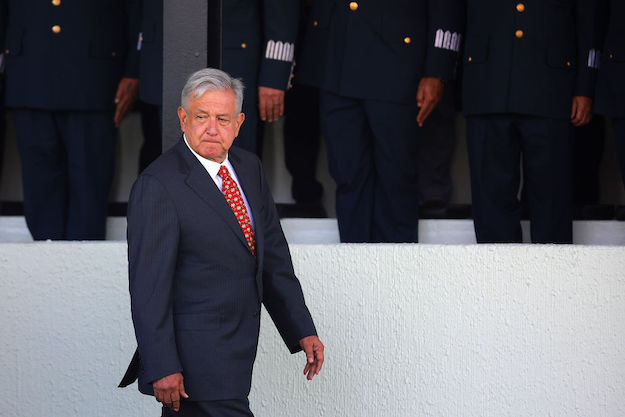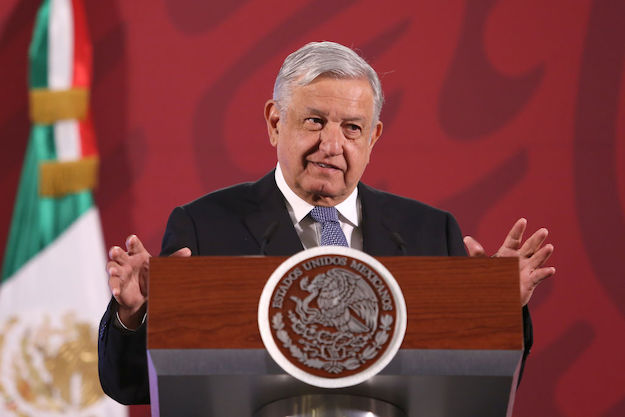MEXICO CITY – Andrés Manuel López Obrador’s popularity is undeniable. In the early stages of his presidency, nothing has seemed to put a dent on his approval ratings or sully the connection he has forged with vast swathes of the Mexican public.
But after last week’s events in Culiacán, Sinaloa – in which López Obrador’s government captured and then released the son of cartel leader “El Chapo” Guzmán – that may start to change. Though AMLO’s approval ratings remain resilient, Culiacán looks like a turning point.
A poll released by newspaper El Financiero on Oct. 22 and conducted in the immediate wake of the Culiacán operation shows that 67% of Mexicans still approve of the job López Obrador is doing as president, a rate essentially unchanged over the last six months.
But beyond mere approval ratings, a deeper problem for AMLO’s administration is starting to emerge.
On Oct. 21, newspaper Reforma released a survey that showed that 56% of Mexicans think the government is failing in its security strategy. The same number said they viewed organized crime as stronger than the government itself. A majority of Mexicans still believe in and trust López Obrador personally, but they do not believe in his plans to keep them safe.
At some point, this dynamic will start to erode the popularity that AMLO has built and re-built over the last two decades.
In his campaign for president, López Obrador crisscrossed the country more than once, and boasts of having visited all 2,457 municipalities in Mexico. While other politicians have focused on governing (both for good and bad), AMLO has listened. For the first time in decades, people in remote and underserved parts of the country feel like they have a president who cares personally about their needs. That’s part of why López Obrador’s approval ratings have survived previous missteps.
But even in the best of circumstances, those numbers would surely fade. AMLO’s approval rating at this point in his term may seem high. But the Mexican public tends to give leeway to heads of state early on. Vicente Fox, for example had a 61.6% approval rating in 2001. Over 65% of Mexicans approved of Felipe Calderón as late as August 2007, and Enrique Peña Nieto was not that far off with an approval rate of 56.2% in 2013. All three came crashing back to Earth.
What’s more, the boost in economic perceptions that marked López Obrador’s election is misleading. In February, the consumer confidence index measured jointly by Mexico’s Central Bank and the national statistics agency reached its highest level since it was created in 2003. AMLO came to power, and suddenly consumers believed their economic outlook had improved.
But the index does not correlate to consumption and is more a reflection of expectations – or hopes – than reality. Real GDP barely grew during the first quarter of this year and completely stagnated during the second. Overall investment has decreased steadily since January – just in July it fell 9% year-on-year.
AMLO promised during the campaign that GDP would grow on average 4% per year during his presidency. That promise was later changed to 2% this year and expectations are now closer to zero. When the zero growth rate for the second quarter was confirmed, the president celebrated that the country had not fallen into a recession and mentioned that GDP was not relevant, as it was development that really mattered.
But several other indicators are moving in the same direction. Formal job creation is slowing. Consumption is barely growing despite the resources that are being dispersed through social programs.
The public could show some leniency when it comes to the economy. AMLO’s implied claim that austerity measures and the fight against corruption are a worthwhile trade-off for slowed economic growth may resonate after a string of corruption scandals under the previous administration. Eventually, though, a struggling economy has political consequences.
What’s more, Mexicans might not be so forgiving when it comes to security. The data were already clear: Mexico’s violence is getting worse. But last week’s events in Sinaloa (as well as violent episodes in the states of Michoacán and Guerrero) have shown in gruesome terms what that really means.
The first anniversary of AMLO’s inauguration is around the corner, and the narrative that the government is dealing with a security disaster that was left for them by previous administrations is nearing its expiration date. The operation to apprehend El Chapo’s son was both a human tragedy and a political disaster. Poorly planned, poorly executed, and terribly communicated.
López Obrador has spent years campaigning, listening and promising a better way. But making promises and making decisions are two different things. As a result, Culiacán has become a byword for a security strategy that, so far, is either inept or insufficient. And proof that popularity can only take you so far.
—
Moy is a professor of economics and the director of policy think tank México, ¿cómo vamos? She is also a member of AQ editorial board.







